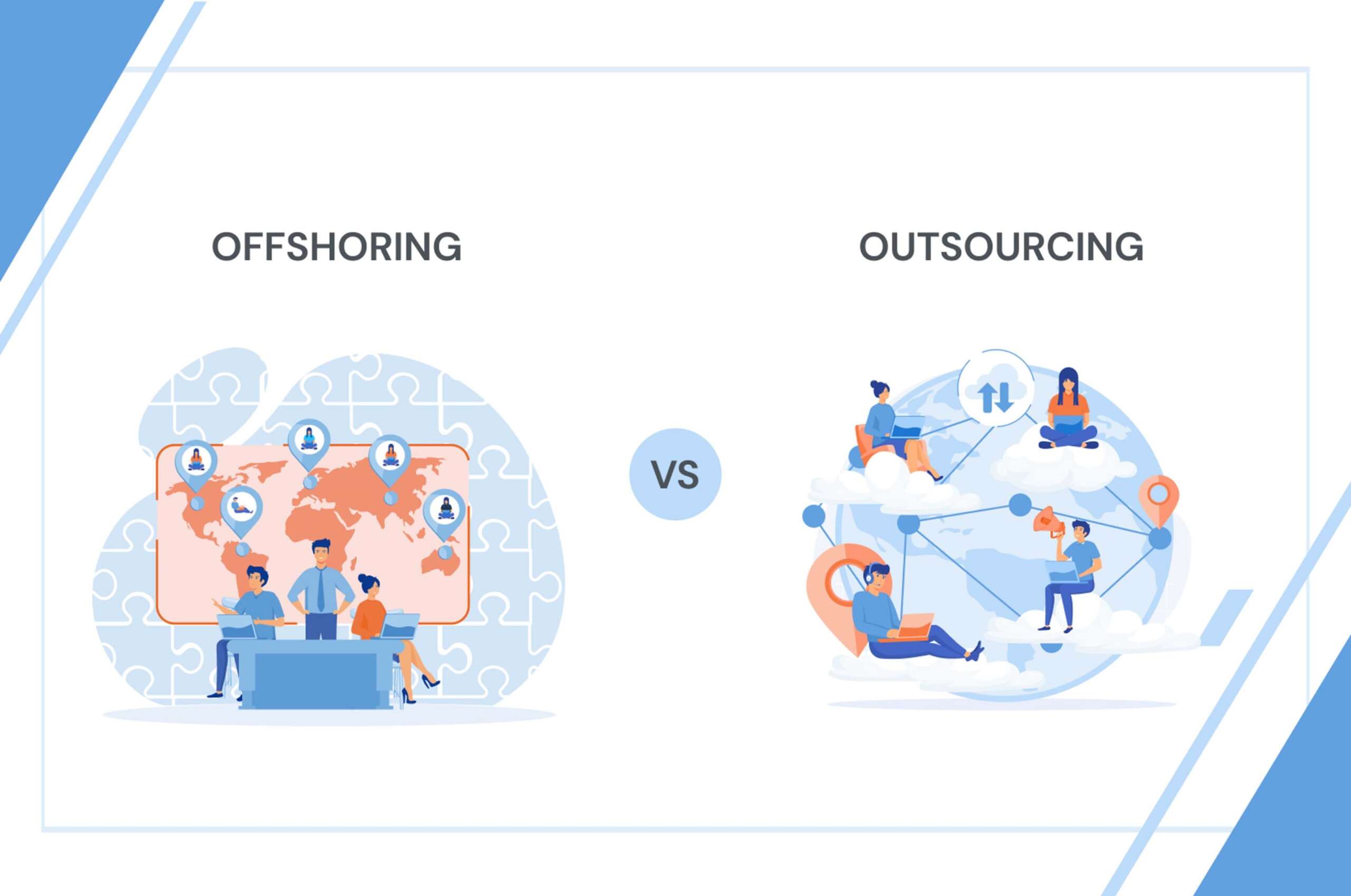The modern ways of businesses have come a long. Offshoring vs. outsourcing is one such trend that has remained popular since its beginning. The article will shed light on difference between outsourcing and offshoring.
The two essential tools of trade are a game-changer for modern businesses. The impact and benefits of the difference between outsourcing and offshoring in ecommerce businesses have both positives and negatives depending upon the nature of the business.
Depending upon the nature of the business, IT companies choose to invest in one of the methods to get the benefits that come along. Prior to investing in any of the methods, it is important to understand the meaning, impression and advantage of both methods for a business.
The article will discuss in detail the impact and advantages of the difference between outsourcing and offshoring.
What is Outsourcing ?
Outsourcing is all about hiring services from a third-party vendor. In such a setup, a company does not produce the product or provide the intended service. Instead, the company purchases the product and services from the hired vendor.
For example, suppose, a company in the UK has outsourced a piece of development work to a company in the UK. This will help the UK company save a major chunk of money with the outsourced services. Because of the cost difference, outsourcing is very popular among companies having a higher cost of development and resources.
What is offshoring?
Companies choose offshoring in order to shift their product to a location that seems to be a bit cheaper compared to the cost of production in the country of origin. As a result, there is a much bigger production setup, which helps save the cost to a great extent.
For example- a BPO wants to relocate to a place that has lesser FTE (full-time equivalent) cost. This shift will bring the cost to a minimal and will help to improve the process as well. However, the ownership of the product or service remains with the original company.
Outsourcing Vs. Offshoring: Pointers of Difference in Detail
- Offshoring involves relocating work to a different geographic location, whereas outsourcing entails delegating tasks previously handled by the organisation to an external entity specialised in the company’s field of job (assigned).
- The primary aim of outsourcing is to concentrate on the core activities or expertise of the company, emphasising its main business, and not on secondary products or services that do not significantly contribute to the company’s revenue. In contrast, offshoring aims to reduce the cost of a particular service or process provided by the company, resulting in cost savings and decreased labour expenses. However, offshoring doesn’t necessarily guarantee an improvement in the overall efficiency of operations.
- Outsourced tasks are typically performed by individuals who are not direct employees of the company, and since the entire process is outsourced, it falls outside the company’s operational scope. Conversely, offshoring involves tasks carried out by the company’s employees, with only the work location being changed. Additionally, these employees remain on the company’s payroll, ensuring a streamlined process.
- In outsourcing, the skill set remains with the external agency, which is self-sufficient and capable of meeting expectations and timelines. This has led to the significant growth of Knowledge Process Outsourcing (KPO) agencies. In contrast, offshoring results in a transfer of skill set within the company, leading to an enhancement of the employees’ capabilities. Furthermore, offshoring tends to be more cost-effective for the company executing the process.
Pros and Cons of Outsourcing and Offshoring for Ecommerce Business
-
Nature of work
The nature of work is a major difference between outsourcing and offshoring. Outsourcing is very much about delegating a task to external resources. However, offshore is all about moving the entire process. Offshoring gives you ownership of a production that has been set up out of the country which is not the case with offshoring.
-
Management Responsibilities
In order to understand the difference between outsourcing and offshoring look for the responsibilities packed with every task. With outsourcing the responsibility of doing a task depends upon the company that has been assigned with the work but the collaboration and communication remains streamlined with the original company.
While in offshoring, the complete control of the task and the entire job is with Offshore company. The process requires the owner to oversee the process, production, and people to ensure a smooth process and production.
-
Cost Saving
The difference between outsourcing and offshoring in terms of cost offers another key variation in both the methods. Engaging in outsourcing proves to be a cost-efficient option, particularly for brief projects (short-term). This approach facilitates substantial savings on labour costs, with potential reductions of up to 70%. In contrast to this, when opting for onshore outsourcing the primary business objective may not necessarily be centred around cost reduction.
Offshoring emerges as an optimal strategy for achieving long-term cost savings. It provides opportunities to reduce not only labour costs but also other operational expenditures, including office leases and different professional utilities.
-
Employee Vs. External Resource
Another point of difference between outsourcing and offshoring is how employee Vs. external resources are managed in both methods. In the outsourcing scenario, the individuals managing your tasks are not directly employed by you; rather, they hold individual contracts with your Business Process Outsourcing (BPO) service provider. In contrast, offshoring involves hiring individuals who become your official employees.
On the other hand, there is a significant difference in terms of investment when it comes to outsourcing tasks. Outsourcing entails no investment in a direct sense, as the individuals are contracted through outside vendors or service providers. In contrast to this, offshoring necessitates an investment in forming new teams and establishing relationships with these employees directly.
-
Difference on the Basis of Investment in Technology
Another outsourcing and offshoring difference is in terms of investment made through the use of technology for both methods. With outsourcing as your principal business plan, you do not need to invest in the infrastructure or other business expenses that a business will entail while offering the services. The company you have outsourced the job to will arrange all the required utilities.
But when offshoring, the business owner needs to invest a hefty amount in the infrastructure, resources and modern technology as well. You are responsible for arranging, deploying and maintaining everything for the business from an offshore location.
-
Establishing Infrastructure
Business infrastructure is required to manage the needs of a business right from logistics to resources and to basic facilities. When outsourcing there is no need to worry about establishing infrastructure as the company offering the services will take care of such things.
Meanwhile, offshoring requires establishing an entire infrastructure to initiate the business process to an offshore location. There are a number of legal processes to take care of in offshoring when investing in an infrastructure. The regulatory processes should be processed depending upon the chosen country’s laws and regulations.
-
Difference in Time zone
Difference in Time zone is a key factor to consider when considering the difference between outsourcing and offshoring. The difference in time zone is important to consider when collaborating on operations. Outsourcing overseas needs you to adjust as per the time zone difference.
When offshoring, the company needs to adjust the work as per the time of the country the work is delegated to. The shift schedules therefore prove to be ideal in order to adjust the time zone difference in order to keep the work smooth along with the communication.
-
Potential Challenges
Both outsourcing and Offshoring have their pros and cons and a lot of challenges as well. Between the two, outsourcing comes with a few challenges. While outsourcing allows cost-cutting, it must be practised with an understanding of cultural disparities, communication and time gaps due to differences in geography and time zones.
Offshoring, on the other hand, has higher risks when it comes to establishing operations in a different geographical location. Offshoring requires due diligence, meaning studying a market that has an entirely different business practice. This requires understanding the practices that are being traded in the country where the work has been offshored.
-
Scalability Factor
Scalability is essential to grow a business. It helps to expand the business and is a major reason for companies to outsource or offshore their work. Outsourcing the operations helps to optimise the process and offer better output. Outsourcing also provides the expertise and the technology required to improve the processes of businesses.
Offshoring, on the other hand, is a method to scale the business in an offshore location. The method is a great way to get global exposure with the expansion of the business. The exposure comes from a broader market, which makes the business more competitive.
-
Difference due to Culture
The difference between outsourcing and offshoring due to variations in culture is not a major concern. However, it is a major point of difference. Therefore, when outsourcing, you must remain open to the cultural difference in order to accept the same.
Moreover, when you are offshoring, the cultural differences must be taken care of. They will help to establish a business in a new location by following all the differences that are prevailing culturally. This also requires understanding a country’s traditions, practices, and other cultural events.
Benefits of Outsourcing
There are several reasons for a company to outsource their projects. While the need for outsourcing may depend upon the specification of resources and available utilities, companies, in general, have great advantages when outsourcing is done the right way.
Here is a brief on the advantages that come along.
Cost benefit
It has been often noticed that outsourcing has a great cost benefit to companies practicing the same. The practice seems to be much cheaper than hiring resources in a similar country. Therefore, outsourcing is generally done to the locations where resources are available at an affordable cost.
Core competency benefit
There are a number of core competencies that a company needs to perform. It includes performing and managing tasks like human resources, information technology, sales, marketing, payroll, accounting, security, transport, logistics and more. Performing “core” activities together and routinely gives the company a competitive advantage.
Quality benefit
When you do not have quality benefit in-house for certain activities, it is better to outsource the task to get the majority of benefits with the result. In such a scenario, it is better to outsource to get the efficiency the company is looking forward to. Resultant product quality in outsourcing is always better when it comes from 3rd party.
Labour flexibility
Outsourcing enables a company to swiftly scale its workforce as required. Consider a scenario where a company requires a substantial number of software programming experts for a specific 6-8-month project to develop an application. Hiring individuals for such a short-term period would be impractical. Outsourcing, on the other hand, offers flexibility, alleviating the need for the company to grapple with the challenges of hiring and letting go of staff for such temporary demands.
Benefits of Offshoring
As it is the case with outsourcing, Offshoring also has benefits that a company can enjoy with this practice. Here are some of the advantages that a company can have with Offshoring.
Cost saving
Typically, companies opt to offshore manufacturing or services to developing countries with lower wages, leading to significant cost savings. These economic efficiencies are then transferred to customers, shareholders, and the management of these companies.
Access to skilled labour
With Offshoring, the workforce is easy to access from a location that has skilled labour at a cost that is affordable to hire. Added to that with a streamlined offshoring process, the cost of recruitment is easy to save. In case, you have an experienced offshore service provider, they will have the necessary expertise to provide workforce.
Improved operations control
Heading over a part of an existing business needs to have control and a continuous watch over the practices that are being performed overseas. This is a major concern with the business that is easy to manage by practicing offshoring.
Reaching new overseas markets
Offshoring introduces your business to a new overseas market that is broader and has better growth opportunities. More to this, an offshore company can easily help to identify profitable opportunities that companies can rely on for doing their work in an offshore market.
In Conclusion
When comparing the difference between outsourcing and offshoring, both methods have their pros and cons for business. Outsourcing suits better to companies that need a single job done by the hired vendor. But offshoring may prove to be more advantageous if a business needs to establish a long-term relationship with an offshore company.
Therefore, depending on the nature of the job and project, you can easily choose between outsourcing and offshoring.









